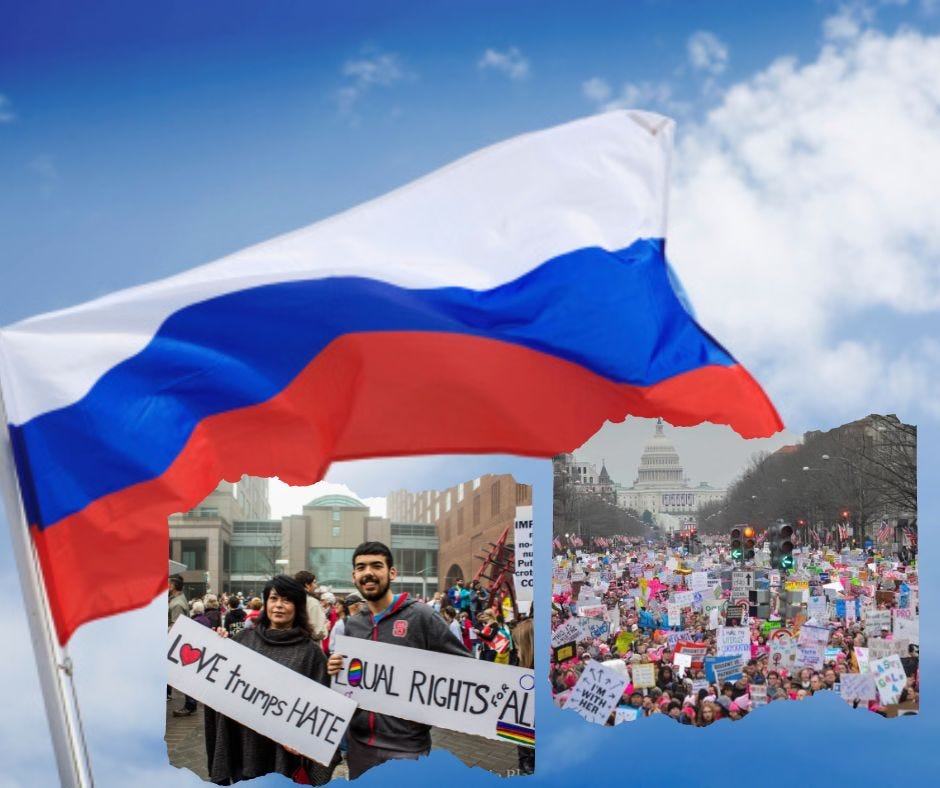“Why Can’t We Do What the Russians Do?”
A friend sent me an extraordinary article from this weekend’s New York Times about how Russia orchestrated an attack on a 2017 Women’s March in opposition to Donald Trump. After what was, by most accounts, a successful event, the march’s organizer began receiving a bombardment of hate tweets focusing on her status as a pro-Palestinian Muslim, which had the effect of discrediting the march as a radical, quasi-terror affair out of touch with responsible thinking.

This is what effective propaganda does: Finds a kernel of factual truth and extrapolates and magnifies it in a manner that will shock the conscience of the mainstream in order to weaken its target. So, if the Women’s March founder has ties to the Rev. Louis Farrakhan, who is known for making anti-Semitic statements, then anything she does should be deemed radioactive. A similar principle was at work when Barack Obama was running for president, and he was called out for his relationship with the race-baiting pastor, Jeremiah Wright. Ronald Reagan faced analogous heartburn when the Ku Klux Klan endorsed him.
Reading the article made me think of a question I often hear, only half-jokingly, from the kinds of businesses and institutions that arrive on my doorstep with crisis management issues: Why can’t we do what the Russians do and try to manipulate public opinion in our favor by using the techniques they use?
Here’s why.
First, most enterprises that I deal with are those with high public stature. They have reputations to lose. If they use disinformation to fight a PR war and get caught, the result will be some cocktail of a PR and reputation nightmare. In addition, there will likely be litigation, a management shakeup and even prosecution, depending upon how the enterprise spreads the information. Companies and institutions have bureaucracies, governing boards and general counsels to get past, and it is rare that risk-averse officials ever green light anything that smacks of a disinformation campaign.
Russia doesn’t have to worry about any of this. Its disinformation apparatus is unfettered and has the blessing of the nation’s leadership, er, leader. Tell me, in what court would the head of the above-referenced Women’s March leader sue Putin for libel, especially in the US, where defamation law is practically non-existent?
Second, the Russians decided a century ago that they could never compete industrially or militarily with the US. However, one area where they had an advantage was propaganda. They had absolute control over their own media and knew they could find simpatico allies in a cohort of journalists worldwide.
And the Russians spent countless billions for the sole purpose of weakening “the Main Enemy,” the United States. The endgame: division and ceaseless harassment.
Americans think like the capitalists we are. It’s all about Return on Investment. When an American company seeks to influence public opinion, it demands to know how its efforts correlate with sales that quarter. The objectives are short-term and specific. On the other hand, the Russians knew they had all the time in the world. The goal was to stir the doodoo and make trouble. It never occurred to them that they would get immediate results. They also knew that many of their efforts would fail. They figured that it was a marathon where quantity mattered. We’ve all heard the saying, “If you throw enough dirt at the wall, some will stick.”
I interviewed ex-KGB officers when working on a book dealing with the US-Russia spy world. One asked me if I knew about the theory that the CIA killed President Kennedy. I said, sure, I had heard that. He asked if I knew where it came from. I said I hadn’t. He said, “What do you think we were doing during the Sixties and Seventies: We were paying left-wing writers to say the CIA did it.” It took a while, but the smear took off and stuck. I asked him who he thought killed the president. He said (as if I was dense), “We knew right away who did it. F-ing idiot Oswald.” And after a beat, he said, “But there was no money in that.”
The clients that come to me with major reputation problems — seriously — have asked me what can be done this quarter for $10,000. The answer is “not much,” but it gives you a sense of what the thinking is among the richest outfits in the world. And, when I tell them what a massive counter-offensive would look like, they say something about the need for all of their messages to be run through their legal and compliance departments. Instead, many fall prey to “hyperbolic discounting” — spending money on things that offer an immediate psychic reward over a program with meaning. Think about the soft-focus “we care” advertising flooding the airwaves.
Of course, the US does its share of propagandizing, but with fierce scrutiny the Russians don’t concern themselves with. During the first Gulf War, the US spent a few hundred thousand dollars spreading propaganda in Kuwait. The media coverage surrounding this minuscule expenditure was relentless, which shows you the kind of wrath spin-meisters face when the media don’t buy what’s being peddled.
In the meantime, the Russians spend billions lying, well outside the bounds of anything resembling ethical and legal restraints, with no expectation of an immediate result other than knowing they just stuck their foot out and made “the Main Enemy” take a massive pratfall into a cesspool. Mission accomplished.

